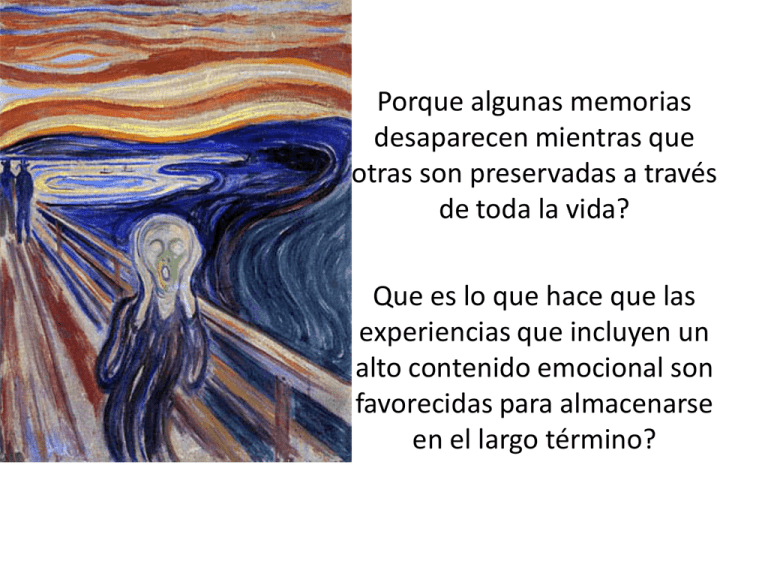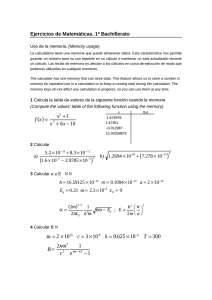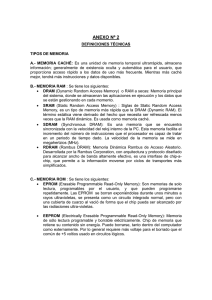Modulcion de la memoria.pdf
Anuncio

Porque algunas memorias desaparecen mientras que otras son preservadas a través de toda la vida? Que es lo que hace que las experiencias que incluyen un alto contenido emocional son favorecidas para almacenarse en el largo término? La calamidad tiene alguna propiedad para almacenarse en nuestra memoria..para siempre Que es lo que hace que las experiencias que incluyen un alto contenido emocional son favorecidas para almacenarse en el largo término? -Las experiencias emocionales son recordadas frecuentemente: rehersal, influye la durabilidad de estas memorias Influencias criticas: Repetición Contenido emocional Olvido: proceso relevante para Memorias triviales Memory Modulation. Memory Modulation. Descartes, The Passions of the Soul, 1650 “Art. 74. En qué son útiles todas las pasiones, y en que nocivas. Ahora bien, fácil es deducir, de todo lo dicho hasta aquí que la utilidad de todas las pasiones no consiste sino en que fortalecen y conservan en el alma pensamientos que conviene que conserve y que, sin ellas, podrán borrarse fácilmente. Y todo el mal que pueden causar consiste en que fortalezcan y conserven estos pensamientos más de lo necesario, o bien fortalezcan y conserven otros en los que no conviene detenerse. Hermann Ebbinghaus (1885) La retención en función del número de repeticiones: FUERZA DE LA MEMORIA “Über das Gedächtnis” James L. McGaugh Center for the Neurobiology of Learning and Memory And Department of Neurobiology and Our memories are not all created equally strong: Some experiences are well remembered, while others are remembered poorly, if at all. The neurobiological processes and systems that contribute to such differences in the strength of our memories is a special quest of research on Memory Modulation. (McG) James L. McGaugh Research Professor, Neurobiology and Behavior School of Biological Sciences Fellow, Center for the Neurobiology of Learning & Memory B.A., San Jose State University, 1953, Psychology Ph.D. Physiological Psychology, University of California, Berkeley 1959 University of California Unfortunately, the complexity of memory is often not recognized and many studies of learning and memory restrict their behavioral analyses to training and testing techniques that are currently in vogue. Learning and memory cannot be simply assayed • A single Pavlovian conditioning trial creates learning that can be detected by careful behavioural testing. • Memory is not easily examined by off-the shelf assays. Placing a rat or mouse in a water maze and starting a timer might be the beginning of an assessment of memory, but it is no more than that. The slow consolidation of memories may serve a highly important adaptive function by enabling endogenous processes activated by an experience, and thus occurring shortly after the event, to modulate memory strength. Hypothalamus activates sympathetic division of nervous system Heart rate, blood pressure, and respiration increase Adrenal medulla secretes epinephrine and norepinephrine Why do our memories and those of other animals consolidate slowly? Blood flow to skeletal muscles increases Stomach contractions are inhibited Why do our memories and those of other animals consolidate slowly? Studding effects of treatments disrupting or modulating learning and memory ---it is essential to distinguish: effects of the treatments on memory --------from : Effects of the treatments on, e.g., attentional, motivational and motor processes that may directly affect the behavior used to make inferences about memory. McGaugh, 1966: The use of post training treatments to alter brain functioning has provided an effective technique for excluding such performance effects in investigating the effects of modulatory treatments on memory consolidation Creando recuerdos duraderos "...... La lenta consolidación de la memoria puede ser una función adaptativa muy importante al permitir que los procesos endógenos activados por una experiencia, y que por lo tanto se produce poco después del evento, modulen la fuerza de la memoria. . " (McGaugh, 1975). m o d u l a c i ó n Evento Aquisición “……….modular la fuerza de la memoria Consolidación Memoria FIJA In-alterable Porque las memorias consolidan lentamente (1960) • No todas las memorias se conservan igualmente bien. • Este hecho tiene sentido de una perspectiva evolutiva y funcional adaptativa … los animales parecerían beneficiarse poco de tener memorias para los acontecimientos triviales que de tener memorias para acontecimientos más importantes. • …..así, tiene sentido que el SNC debe haber desarrollado los mecanismos para almacenar la información que reflejan el grado a el cual la información vale el almacenar. • Los sistemas que regulan almacenaje de información son claramente tan importantes para una supervivencia de los organismos como son esos mecanismos de los nervios que almacenan la información. El concepto de la modulación …..McGaugh Stress-Released Hormones Arousal/Stress Brain Activation Anterior Pituitary Autonomic Nervous System ⇓ Adrenal Cortex ⇓ Cortisol (corticosterone) ⇓ Adrenal Medulla ⇓ Epinephrine (Adrenaline) James L. McGaugh Center for the Neurobiology of Learning and Memory And Department of Neurobiology and Behavior University of California, Irvine Amygdala Inhibitory Avoidance James L. McGaugh Center for the Neurobiology of Learning and Memory And Department of Neurobiology and Behavior University of California, Irvine Creando recuerdos duraderos Epinefrina Administrada luego del Entrenamiento DEBIL facilita memorias de miedo (Inhibitory Avoidance Training ) 250 200 150 100 Retención = Latencias Entrenamiento Débil! 5 0 0 0 30 120 Time of Posttraining Injection (min) Saline Controls Gold and van Buskirk, 1975 10 Epinephrine Daño en la amígdala deteriora la mejora de la memoria en ratas • Animales con NE sistémicamente muestran mejor memoria • Amígdala- lesiones: bloquean el efecto de NE sobre la memoria 180 160 140 120 100 80 60 40 20 0 Saline NE Sham Amyg Lesion Noradrenalina se libera en la Amigdala después de entrenamientos de memorias de miedo James L. McGaugh Center for the Neurobiology of Learning and Memory And Department of Neurobiology and Behavior University of California, Irvine Inhibitory avoidance increases amygdala NE levels for at least 2 hours (From McIntyre CK, Hatfield T, and McGaugh JL (2002) Percent of baseline norepinephrine following inhibitory avoidance training is graphed for each individual rat. James L. McGaugh Center for the Neurobiology of Learning and Memory And Department of Neurobiology and Behavior University of California, Irvine Noradrenalina se libera en la Amygdala después de entrenamientos de memorias de miedo Cuánto tarda la rata en salir??? Latencia 800 600 SEC 600 SEC 600 SEC 600 SEC 342 SEC 227 SEC 10 SEC % of Baseline NE 700 600 500 400 300 200 100 0 1 2 3 4 5 McIntyre, Hatfield and McGaugh, 2000 8 9 IA 7 15 min sample 10 11 12 13 14 de Heuer & Reisberg 1990 Individuo SM Control Emotional Stimuli ‘CT Arousing slices de Heuer & Reisberg 1990 SM046 Score on Memory Questionnaire 90% 80% 70% 60% 50% 40% 30% 20% Most arousing slide 10% Brain-damaged controls 0% 1 2 3 4 5 6 7 8 9 Slide Number 10 11 12 de Adolphs et al. Learning & Memory, 4, 1997 Amygdala activity at encoding ---correlated with long-term, free recall of emotional information Amygdala Activity (PET) During Encoding and Long-Term Explicit Memory from Cahill et al PNAS, 93: 8016-21 (1996). TRAINING FEAR CONDITIONONG EN T-MAZE: Mice were given four training trials in which to learn to avoid receiving footshock in a T-maze runway COMIDA 18 hs 3 hs TR 18 hs TR 0 hs COMIDA AD LIBITUM TR 0 hs COMIDA p < 0,05 1 SEMANA TEST COMIDA AD LIBITUM 1 SEMANA TEST COMIDA AD LIBITUM 1 SEMANA TEST COMIDA AD LIBITUM p < 0,01 •Cholecystokinin which is a gastrointestinal hormone released during feeding, also enhances memory retention when administered intraperitoneally. •This memory-enhancing effect of CCK-8 is blocked when the vagus nerve is cut, … Thus, CCK-8, a peripherally acting peptide, may mediate the memory-enhancing effects of feeding. COMIDA AD LIBITUM TR 30 seg COMIDA AD LIBITUM TR 30 seg SAL (ip) 1 SEMANA TEST CCK (ip) 1 SEMANA TEST La administración de CCK ip post-training facilita la memoria NON-OP SHAM COMIDA AD LIBITUM TR 0 seg SAL (ip) 1 SEMANA TEST CCK (ip) VAGOTOMIA SAL (ip) Control: CCK (ip) Ninguno de los 3 grupos difiere en la adquisición La vagotomía revierte el efecto facilitador de CCK Control Hormonal del Comportamiento u Orquestación hipótesis: Kravitz 1979 Behavioral output of circuit CNS Environmental cues Neuromodulator (in or out CNS) Circuit that does something Sensory cues Endogenous neuropeptides (opiods and CCK) as Co-ordinators of Food Seeking Activity (Morley-) Amnesic of unpleasant events Endogenous opiods Enhanced Increased Foraging activity Predatory efficiency Feedings drive 1. Locomotion 1 Analgesia 2. Decrease copulatory 2 Enhance immune Recognition of Appropriate drive non-toxic prey CCK release Successful Foraging Expedition And Satiety Enhance memory of successful foraging strategy Social amnesia in mice lacking the oxytocin gene Jennifer N. Ferguson, Larry J. Young, Elizabeth F. Hearn, Martin M. Matzuk, Thomas R. Insel & James T. Winslow • Ratones macho Oxt -/- desde nacimiento. • Ratones Oxt -/- y Oxt +/+ tienen la misma experiencia post-natal. Ratones Oxt -/- tienen afectada este aspecto de la memoria social (Familiaridad social). Memoria espacial Morris water maze Y maze Ratones Oxt -/- no muestran déficit en memorias espaciales. Farmacologìa CSF OT OT-A AVP Administracion aguda ICV de Oxt rescata la memoria social en Oxt -/-. "Memory reactivation goes far beyond expression" memorybeyondexpression.wordpress.com Mismatch Los efectos amnésicos de algunos agentes – Escopolamina pueden ser explicados como cambios en los procesos de toma de decisión que intervienen entre memorias reactivadas y la respuesta conductual Reinforced =NO Mismatch La Expresión de la Memoria puede ser independiente de su labilización /reconsolidación? APÍTULO XX DIFERENCIA DE TIEMPOS 26. Pero lo que ahora es claro y manifiesto es que no existen los pretéritos ni los futuros, ni se puede decir con propiedad que son tres los tiempos: pretérito, presente y futuro; sino que tal vez sería más propio decir que los tiempos son tres: presente de las cosas pasadas, presente de las cosas presentes y presente de las futuras. Porque éstas son tres cosas que existen de algún modo en el alma, y fuera de ella yo no veo que existan: presente de cosas pasadas (la memoria), presente de cosas presentes (visión) y presente de cosas futuras (expectación). Augustine, Confessions, Book 11, Chapter 20. Martin Heisenberg CON 2004 LABORATORIO DE NEUROBIOLOGÍA DE LA MEMORIA DEPARTAMENTO DE FISIOLOGÍA, BIOLOGÍA MOLECULAR Y CELULAR FACULTAD DE CIENCIAS EXACTAS Y NATURALES UNIVERSIDAD DE BUENOS AIRES INSTITUTO DE FISIOLOGÍA, BIOLOGÍA MOLECULAR Y NEUROCIENCIAS CONICET •Alejandro Ojea •Antonio Sandoval •Francisco J Maza •Heidi Gonzalez •Gabriela V Nieva •Enrique Portiansky UNLP •Karina Barreiro •Fernando Locatelli •Leticia Smal •Jimmy Stehberg. Universidad Andres Bello, •Lia Frenkel •Mariano Blake UBA •Leonardo Bloise •Víctor Molina UNC •Luis Suárez •Valeria N. Peszano •Pedro Caffaro •Sabina Alzugaray •Verónica Coccoz U.B.A CONICET Short term neuronal activity reflecting long term memory persistence independently of its behavioral expression. Neural correlates of expressionindependent memory traces in the crab Neohelice. Studding neural correlates of expression-independent memory traces in the corpora pedunculata (Mushroorms bodies) crab Neohelice

